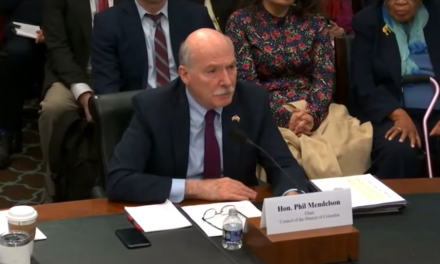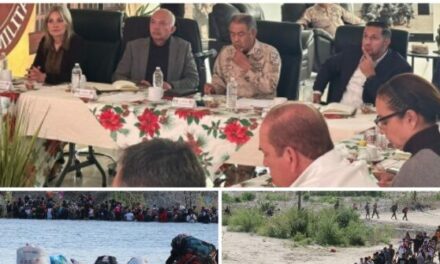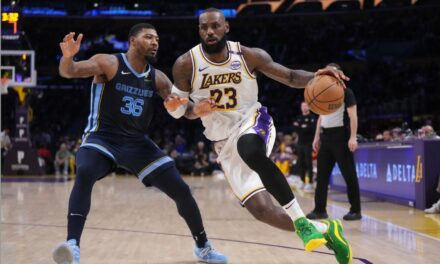We support our Publishers and Content Creators. You can view this story on their website by CLICKING HERE.

Russian President Vladimir Putin is ready for talks with U.S. President-elect Donald Trump at any time he revealed Thursday during a lengthy year-end press conference.
Trump said during his successful 2024 presidential campaign that he would quickly negotiate an end to the war in Ukraine, possibly even before taking office in January.
Putin was specifically asked about Trump’s desire to negotiate a ceasefire in Ukraine. The Russian autocrat responded he was ready for “negotiations” and “compromises.”
“I don’t know when I’m going to see him. He isn’t saying anything about it. I haven’t talked to him in more than four years. I am ready for it, of course. Any time,” Putin said.
“If we ever have a meeting with President-elect Trump, I am sure we’ll have a lot to talk about,” he added.
Putin insisted Russia will not be in a weaker position to negotiate due to recent setbacks in the Middle East, such as the overthrow of Russia-backed Syrian dictator Bashar Assad, or battlefield losses in Ukraine.
“You said that this conversation will take place in a situation when I am in some weakened state,” Putin said mockingly to NBC News reporter Kier Simmons. “And you, and those people who pay your salaries in the US, would very much like Russia to be in a weakened position.”
“I adhere to a different point of view. I believe that Russia has become much stronger over the past two or three years. Why? Because we are becoming a truly sovereign country, we are already hardly dependent on anyone,” Putin said.
Putin claimed Russia is “thinking” about whether it still needs its military bases in Syria, implying it would be no great loss if the insurgent government decides to void Moscow’s leases and kick Russian forces out of the country. He claimed the “overwhelming” majority of Syrians want the Russians to stay.
“We’ll need to decide for ourselves how our relationships will look with those political forces that now control and will control the situation in the country in the future. Our interests need to coincide,” he said, offering his first public comments on the fall of the Assad regime.
Putin added that he has not spoke with Assad since the deposed Syrian dictator sought refuge in Moscow, but he plans to do so, and he promised to inquire about the fate of American journalist Austin Tice, who was kidnapped in Damascus in 2012.
As for the situation in Ukraine, Putin claimed victory was in sight after years of bloody stalemate.
“We are moving towards resolving the primary aims that we set at the start of the special military operation,” he said. “Our guys are fighting heroically. The capabilities of the armed forces are growing.”
Later in his question-and-answer session, a woman from the Kursk region asked when thousands who were evacuated following a Ukrainian counter-invasion in August might be able to return home. Putin’s triumphalist pose wavered a bit, as he admitted he could not say when Kursk would be retaken, but he was confident it would happen eventually.
“We will absolutely kick them out. Absolutely. It can’t be any other way. But the question of a specific date, I’m sorry, I cannot say right now,” he told the Kursk resident.
“It is unclear why – there was no military sense in the Ukrainian Armed Forces entering the Kursk region, or holding on there now as they are doing, throwing their best units there to be slaughtered. But nevertheless, it is happening,” he said.
“I understand that there is nothing good about what is happening to you,” he told the woman from Kursk. “People are suffering heavy losses, hardships, and daily inconveniences, especially those related to children. But rest assured, we will do everything necessary. We will restore everything.”
Putin did not mention the North Korean mercenaries brought in by Russia to beef up the Kursk campaign, or the heavy casualties those North Korean troops have reportedly sustained. He said only that “our guys” are fighting “serious battles” in the region.
Putin’s conference came a day after Ukrainian President Volodymyr Zelensky admitted that, even with gigantic amounts of military and financial assistance from the United States and Europe, his forces will not be able to recapture the territory occupied by Russian forces in eastern Ukraine and Crimea.
“De facto, these territories are now controlled by the Russians. We do not have the strength to recover them. We can only count on diplomatic pressure from the international community to force Putin to sit down at the negotiating table,” Zelensky told French newspaper Le Parisien on Wednesday.
Zelensky added that his government will not “give up our territories,” because “the Ukrainian constitution forbids us to do so,” but his concession that military force cannot accomplish that goal marks a significant shift in his rhetoric – and supports Putin’s claim that Russia would not enter ceasefire negotiations from a position of weakness.
Late last month, Zelensky conceded that Crimea – which has been occupied illegally by Russian forces since 2014 – could only be “brought back diplomatically.”
Zelensky also suggested NATO might declare all of the Ukrainian territory not yet seized by Russia to be under its protection, effectively freezing the current battlefront so ceasefire negotiations could begin – an implicit concession that Russia is likely to capture more of Ukraine if the war continues.
In October, Zelensky touted a “victory plan” for ending the war that was a great deal less ambitious than his “peace plan” proposal in 2023, despite its more grandiose name. The 2023 plan envisioned Russia withdrawing from all occupied Ukrainian territory, including Crimea, and paying reparations to Ukraine for the war.
Even in October, Zelensky was still saying the only way to “force” a ceasefire was for Russia to “lose the war,” but he no longer uses such aggressive language.

 Conservative
Conservative  Search
Search Trending
Trending Current News
Current News 





